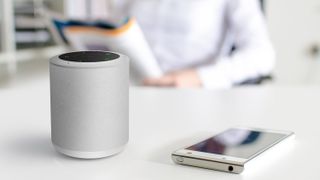NHS will use smart speakers to identify at-risk patients
Alexa, are you there?

The UK's National Health Service will leverage smart speaker technology to identify patients at risk of self-harm or suicide, according to a report published today (February 11).
Commissioned by the NHS, Dr Eric Topol's report pointed to the inevitable implementation of digital technologies in the health service, such as AI medical scanners and even forms of therapy hosted in virtual reality - and signalled the use of voice assistants to enhance the amount of patient support available.
The report also clarified that London hospices were already laying the groundwork for AI-based patient support.
- What is the best fitness tracker of 2019?
- How Headspace helped our writer find a place of calm
- Gaming disorder is now classified as a mental health condition
Increasing calls for mental health provision have been one of the major challenges facing the NHS in recent years, and it's no surprise it's looking to technology to assist with it.
Smart assistants like Amazon Alexa and Google Assistant are now widely implemented in millions of homes and businesses, and regular citizens' are increasingly prepared to use voice-controlled AI for a number of daily tasks.
I hear you
Years after the advent of health service 'chatbots', designed to help users through common health concerns, smart assistants like Amazon Alexa or Google Assistant are finding a wide variety of health related uses in the NHS and elsewhere.
The technology is likely to prove a double-edged sword; while using robot assistants to listen to people's problems may be time-efficient, it's easy to feel an emotional disconnect when you're not speaking to a real, living doctor.
Get daily insight, inspiration and deals in your inbox
Get the hottest deals available in your inbox plus news, reviews, opinion, analysis and more from the TechRadar team.
When looking to new tech to improve our mental health, we have to make sure it doesn't further isolate us from each other - otherwise what good is it doing?
- The best smart speakers 2019: which one is the best?
Via The Telegraph
Henry is a freelance technology journalist, and former News & Features Editor for TechRadar, where he specialized in home entertainment gadgets such as TVs, projectors, soundbars, and smart speakers. Other bylines include Edge, T3, iMore, GamesRadar, NBC News, Healthline, and The Times.

